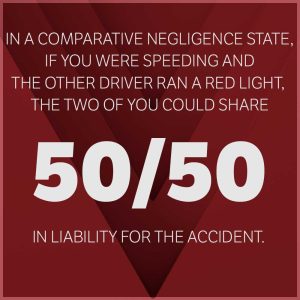
What you’ll learn in this article:
- How negligence and personal injury claims work
- Kentucky comparative negligence laws
- How to sue for negligence
If you are injured in an accident, you would file what’s known as a personal injury claim. When you file this claim, you can potentially recover a settlement for the damages you suffered as a result of the accident, such as medical expenses or lost wages. However, to win your case you may need to show that another party’s negligence caused the accident and your injuries.
In every state, the negligence laws can vary, which can play a role in your case. For example, some states are no-fault states, some are at-fault states, and some states follow contributory negligence laws while others follow comparative negligence laws.
In this article, we’ll help you understand how negligence and personal injury cases work and explain what Kentucky’s fault and negligence laws are. If you are injured in an accident and have questions or need help filing a claim, please don’t hesitate to contact us for assistance. Our team of Kentucky personal injury lawyers at McCoy & Sparks is here to help.
What Does Personal Injury Negligence Mean?
Negligence and personal injury cases go hand in hand. Typically, when someone is injured in an accident, they would file a claim, either with their own insurance or the insurance company of the at-fault party. This will depend on whether it’s an at-fault or a no-fault state.
Kentucky is a “choice no-fault” state, which means that the injured party can choose to carry no-fault insurance and can file a claim through their own insurance company. Or, they can opt out of the no-fault coverage. If they opt out, they can file a claim against the at-fault party’s insurance instead.
However, to do this, they will need to prove that the party they are filing against is the one responsible for what happened. In other words, if you get hit by another driver, you must prove that the driver acted in a negligent manner if you want to hold them and their insurance liable. If you cannot prove this, then the insurance company will likely deny your claim.

When we talk about negligence, we are referring to someone breaching their “duty of care” and you must be able to prove they breached their duty if you want to recover damages from their insurance company. Duty of care refers to the legal duty that all drivers have.
Duty of care essentially means drivers must operate their vehicles with reasonable care so as not to cause harm to others. If they do something like speed, run a red light, or drink and drive, this is considered a breach of duty. If this is the case, they are viewed as negligent and could be held liable for any accidents they caused as a result of their negligence.
How Pure Comparative Negligence in Kentucky Can Affect Your Case
Aside from generally needing to prove negligence when you file a claim against another party, the specific type of negligence laws in your state can also affect your claim. In a contributory negligence state, for example, you will be barred from recovering damages if you were partially at fault for the accident.

In contrast, in a comparative negligence state — like Kentucky — you can still file a claim and recover damages even if you are partially at fault. However, the amount you recover will be impacted by your percentage of fault.
For example, if the other party is 100% at fault, then you should be able to file a claim and recover the full amount you are awarded. However, if you were speeding and the other driver ran a red light, the two of you could share 50/50 in liability for the accident.
In this case, you can still file a claim but you will only recover 50% of what you are awarded. If you were awarded a $30,000 settlement initially, you will only end up recovering 50% of that, which is $15,000.
Can You Sue For Negligence?
Yes. If you meet certain thresholds, which essentially means that you have sustained extensive damages and injuries as a result of an accident, it may be possible for you to file a lawsuit against the negligent party. However, as mentioned above, you will need to be able to first prove that the party owed you a duty of care and that they breached this duty if you intend to hold them accountable for the accident.
To do this, you will need to work with a lawyer. Personal injury claims can be challenging to navigate as is, but things can become even more complex when you are suing for negligence with an injury. You will need to gather a substantial amount of evidence to prove what happened and that you deserve more money than you were initially offered as part of your personal injury claim, which a lawyer can help you do.
Trust McCoy & Sparks—Premier Personal Injury Attorneys in Central Kentucky
Recognized as one of Central Kentucky’s best law firms, McCoy & Sparks represents thousands of clients in Central Kentucky. If you were injured in an accident and need help navigating your claim and understanding how Kentucky’s negligence laws will affect you, we are here to help. We can also represent you in court if you need to file a lawsuit for additional compensation.
You owe us nothing unless we win your case. Call us at (844) 4KY-WINS for a risk-free consultation with one of our personal injury attorneys today.

